I Dig Sports
England had 'no answers' to Ellyse Perry burst, admits coach Mark Robinson
Published in
Cricket
Sunday, 07 July 2019 11:19
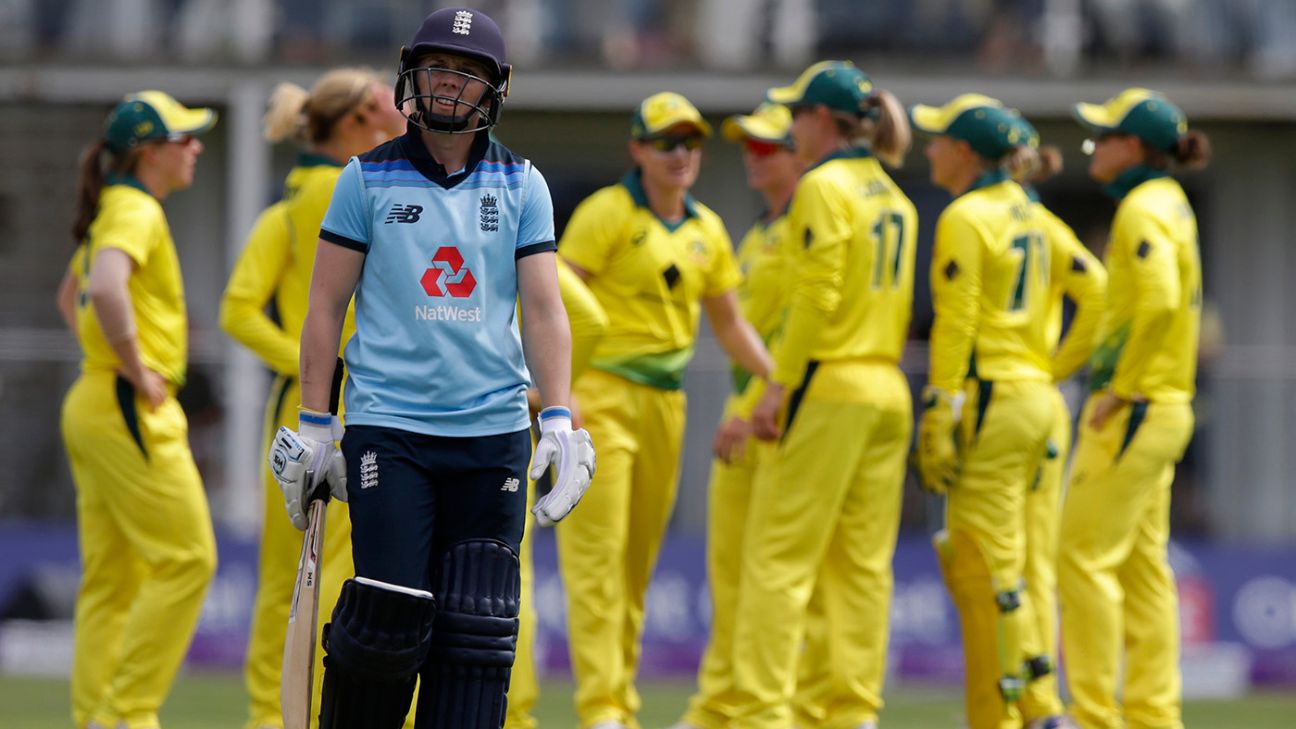
Mark Robinson, England women's head coach, admitted his team "had no answers" to the onslaught from Australia's new-ball pair after being blown away for 75 in the third ODI. A 194-run defeat at Canterbury has left England 6-0 down in the Women's Ashes and needing to virtually win every match to reclaim the trophy.
Ellyse Perry starred with 7 for 22 - record figures for Australia - while Megan Schutt claimed two of the other three wickets to fall while sending down nine overs for 21. Having clawed Australia's innings back to 269 for 7, England never got close to a record chase.
Heather Knight, England's captain, admitted that the batting had been "not good enough", as they slipped to 21 for 6 on the way to their third-lowest total in women's ODIs. Having also been 19 for 4 in the first match, which Australia won by two wickets, Robinson said his players needed to find a way to combat the visitors' attack.
"It's hard to put it into words," he told Sky Sports. "The first half was okay, we fought hard, at one point it looked like 320-30 and we did well, so 270 and what looked like the best wicket we'd played on. So we had high hopes at halftime but within half an hour those hopes are dead.
"The better team puts you under pressure for sustained periods, they maintain an area and a length - the lesser teams let you off with a four-ball here and there. The better teams don't do that, at the moment Perry and Schutt have bowled outstandingly well and we've had no answers, which is disappointing. It's an attack we've done well against previously, so it's surprising that in two of the three games we've been falling over so quickly."
Knight said that the team had to have "honest conversations" about what had gone wrong and focus on getting back into the series in the Test at Taunton, which is worth four points.
"Not good enough. It's very tough to take, because a lot of girls are hurting in that dressing room. Australia bowled well, they came at us hard and we didn't really have an answer to that. We haven't started how we wanted to with the bat, we haven't found a way to start our innings and get our feet going."
With Australia holding the Ashes, England have to win the series outright - something they can only do by winning the Test and at least two of the T20Is. A draw at Taunton would be enough for Australia to claim an unassailable lead and extend their hold on the Ashes, which they regained in 2015.
Test cricket will pose different challenges, because the women play the format so infrequently. While there is the potential for personnel changes, with England playing Australia A and their academy team taking on the Australians in warm-up matches, Robinson said there was no need for drastic measures.
"The first thing is you've got to be calm," he said. "They're hurting, they'll want to do better, they're desperate to do better, so there's no point shouting and bawling. We've got to make sure we stay calm and we try and get back on track, get some simplicity into the play. Maybe the tempo of the Test match will help us... We've got to take stock, hopefully regroup and come back stronger."
Robinson also said that he was hopeful Katherine Brunt would be fit to play a part in the rest of the Ashes. Veteran allrounder Brunt twisted her ankle during the second ODI and was not fit enough to be included at Canterbury.
"We're hoping so. She's a warrior, she did brilliantly to go out on the pitch the other day, epitomises the heart of the team, and we just hope she's back. She's a hard girl to replace but we're going to have to find a way soon because she's in her twilight years now."
Tagged under
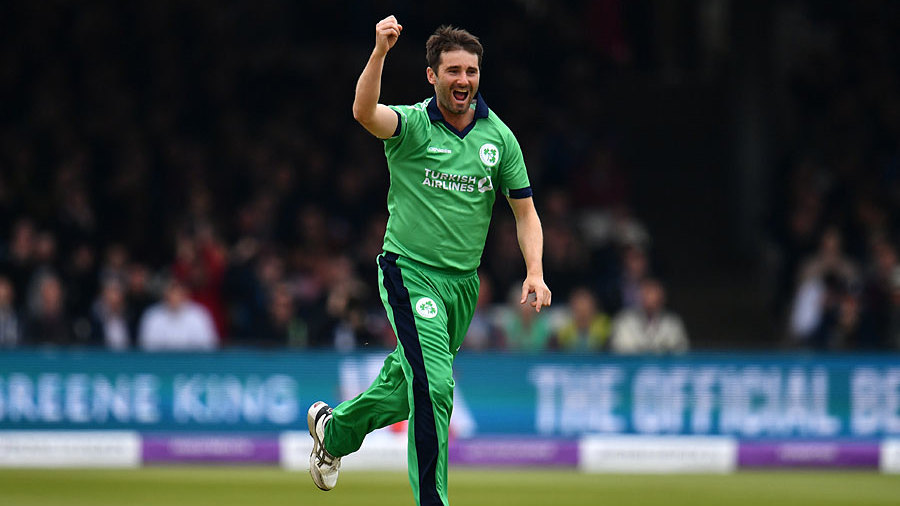
Ireland 191 for 4 (McCollum 54, Porterfield 49) beat Zimbabwe 190 all out (Williams 67, Murtagh 3-39) by six wickets
James McCollum's second fifty of the series, and a nuggety 49 from captain William Porterfield, took Ireland to an historic six-wicket win over Zimbabwe in Stormont. Following on from his fifty in Ireland's series-sealing win on Thursday, McCollum set up Ireland's pursuit of Zimbabwe's 190 with 54 at the top of the order. Porterfield's knock pushed Ireland closer to victory, and an unbeaten 35 from Kevin O'Brien secured their very first ODI series clean sweep over a fellow Full Member.
With swing on offer with the new ball, McCollum didn't have it all his own way early in his knock and was given a particularly thorough working over by Kyle Jarvis, playing and missing at three outswingers in a row. But Zimbabwe couldn't make any inroads, despite several near misses and one clear chance that came their way. In the second over of Ireland's chase, Tendai Chatara drew a false shot from Paul Stirling, a leading edge presenting Sean Williams with a tough high chance running back from cover, but it was spilled and Ireland cruised through the Powerplay at better than five an over.
Having scored six consecutive fifty-plus ODI scores, Stirling was in sight of a seventh when he edged an attempted cut off Chatara to fall for 32. Zimbabwe snaffled a second wicket just before the first drinks break, Andy Balbirnie top edging a sweep off Williams before he could get going, but after the interval McCollum and Porterfield continued to find the boundary whenever one was needed to ease pressure.
Porterfield nudged his way past 4,000 ODI runs during a 43-run third wicket stand that steadied Ireland and took the score beyond 100 in the 23rd over. At the other end, McCollum raised his fifty with a handsome drive through cover off Solomon Mire, but then fell against the run of play in Mire's next over, driving a long half volley uppishly into the covers, where Ryan Burl dived to his right to hold the catch.
By then, Ireland needed only 81 more runs from the better part of 25 overs, and Porterfield steadily whittled away at the target alongside Kevin O'Brien. So effective in the last match, today Zimbabwe's spinners struggled to pin Ireland's middle order down, with Porterfield putting the sweep to particularly good use against Sikandar Raza's offspin.
It was Ryan Burl's part-time legspin that finally got the better of Porterfield, however, as he was beaten by sharp turn and bowled for 49 in the 37th over, with Ireland needing just 32. O'Brien administered the last rites, batting a little within himself but still allowing for the odd moment of flair.
"We set out to win the series and obviously to win it 3-0 is pretty good," Porterfield said after the game. "Starting back in May, quite a few cricketers have come in. It's really pleasing that the lads are coming in and making contributions. There's depth in that pool of players and the confidence is right up there."
It was one of Ireland's veterans who set the match up. Once again utilising the conditions expertly, Tim Murtagh picked up 3 for 39 to lead the attack. He found the outside edge of Burl's bat in the third over of the morning, the left-hander having been promoted to open, and then snapped up the vital wicket of Brendan Taylor for the second time in the series. With Craig Ervine dragging a pull at Mark Adair onto his own stumps, Zimbabwe were three down early and the slide began in earnest.
They were tottering at 88 for 6, but Richmond Mutumbami joined a settled Williams at the crease to steady things somewhat with a 43-run stand. Boyd Rankin's pace and bounce snapped the partnership, Mutumbami wafting flat-footed outside off to be caught behind, but after him Jarvis also showed a little stickability to chaperone Williams to his second fifty of the tour.
Williams' desperately unlucky dismissal for 67 - run out at the non-striker's end as Adair palmed a firm drive from Jarvis back onto the stumps - completely opened up Zimbabwe's tail. Jarvis attempted to push things on with a couple of lusty blows, but two overs later Zimbabwe were all out for their lowest total of the tour.
"I'm obviously getting on a bit now, but still enjoying my cricket," Murtagh said after being named Player of the Series for his nine wickets. "And these boys keep me young. I'm enjoying it. They're good kids. They're desperate to learn. Mark's last over in the last game was really special. Shane [Getkate] looks like he's been playing for years."
"We haven't played our best cricket," admitted Zimbabwe captain Hamilton Masakadza. "Ireland have showed us up and really put us under the pump. We need to make better decisions under pressure. That's what Ireland have done, every time they're on top, they haven't let us come back."
Tagged under
'We'll be doing everything we can to nullify Bairstow and Roy' - Justin Langer
Published in
Cricket
Sunday, 07 July 2019 11:17
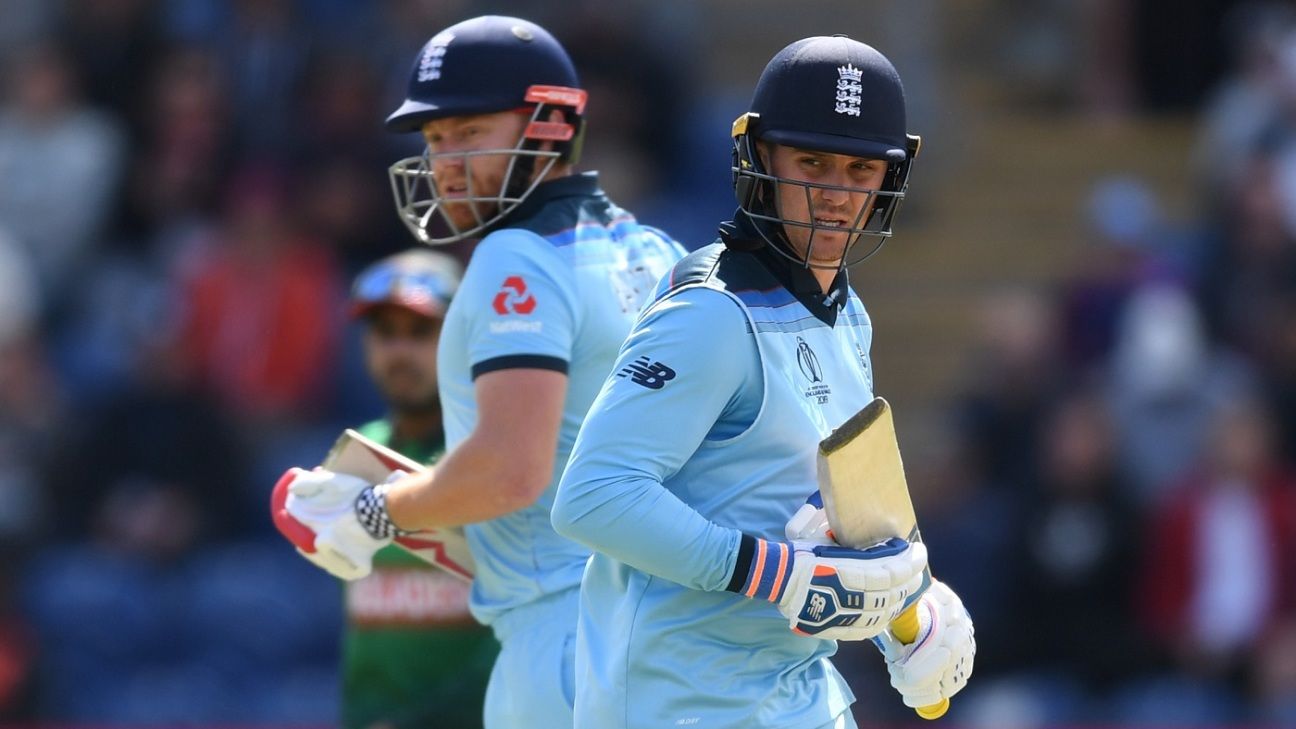
Take early wickets. It's an obvious goal, one that is frequently offered ahead of any match. But, as they head for Edgbaston to face England in their semi-final, Australia know that breaking the opening partnership of Jonny Bairstow and Jason Roy is likely to be key to any possibility of reaching the final.
When Australia beat England by 64 runs in their group match at Lord's, Roy was out with a hamstring injury, but Justin Langer acknowledged that England are a much more formidable side when their opening twins are conjoined.
"It's like us bringing back Steve Smith and David Warner and Mitchell Starc," Langer said. "Whenever you take your best players out it changes the confidence in the group and we respect that, we know. That's why I've said all along, I think England is the team to beat at the World Cup. They've done brilliantly for the last few years, they deserve to be the best team in the world. You've still got to beat them, it doesn't matter how you play."
While Australia took their final group match against South Africa deep into the final overs, hampered by injuries to Usman Khawaja and Marcus Stoinis, their inability to take wickets in the opening Powerplay was costly and uncharacteristic, something they hope to turn around against England.
"We didn't stick to our game," Langer said. "They were 0 for 70 after the first 10 - we pride ourselves on trying to take wickets early, we pride ourselves on keeping wickets available in the first 10.
"Bairstow and Roy are a huge part of England's success and we'll be doing everything we can to nullify that."
Langer said he's expecting to encounter a flat pitch at Edgbaston. The semi-final will be played on a fresh strip in the centre of the field, eliminating the short boundary that was a talking point during India's loss to England and win against Bangladesh. But, despite the fact that 16 of the past 22 games in the tournament have been won by the team batting first and several pitches have slowed noticeably through the course of a match, Langer doesn't believe that pitches have been the overriding reason for unsuccessful chases.
"We've seen it [deteriorating pitches] once for the whole tournament. Maybe once or twice. The England vs New Zealand game seem to get harder.
"It's more the batting first at a World Cup than the pressure of the wickets. A lot of teams have chased and won in the last few years, it's become a bit of trend but not here. I think that's the pressure not the wickets. When it comes to the day, whether you bat first or you bowl first, you've just got to be at your best."
Not only can Australia deprive England of a World Cup final; by winning at Edgbaston, they could deny English fans the opportunity to watch the match on free-to-air television; only if England make it to Lord's will Sky agree to open up the broadcast to a free-to-air partner. But Langer dismissed the notion that such matters could heap added pressure on England.
"I think when it gets to the game, they won't be worried about free-to-air TV or what Michael Vaughan or anyone else says," Langer said. "I think they will be thinking about beating us in the semi-final. There would be lots of talk and lots of noise around about the reasons why they would be determined, they have been very good for the last few years. They are playing great cricket. They will come in confident after the last two games. They will have enough pressure, we will have enough pressure, and that is what World Cup semi-finals are all about.
"They can build it up as much as they want to, England, or the media can build it up on England, but I am not worried about the pressure on England. We have got enough of our own to deal with, our own problems to solve over the next three or four days. We will do that then put our best foot forward for the semi-final."
Tagged under
The USWNT is on top of the world again, but the gap is closing
Published in
Breaking News
Sunday, 07 July 2019 11:12
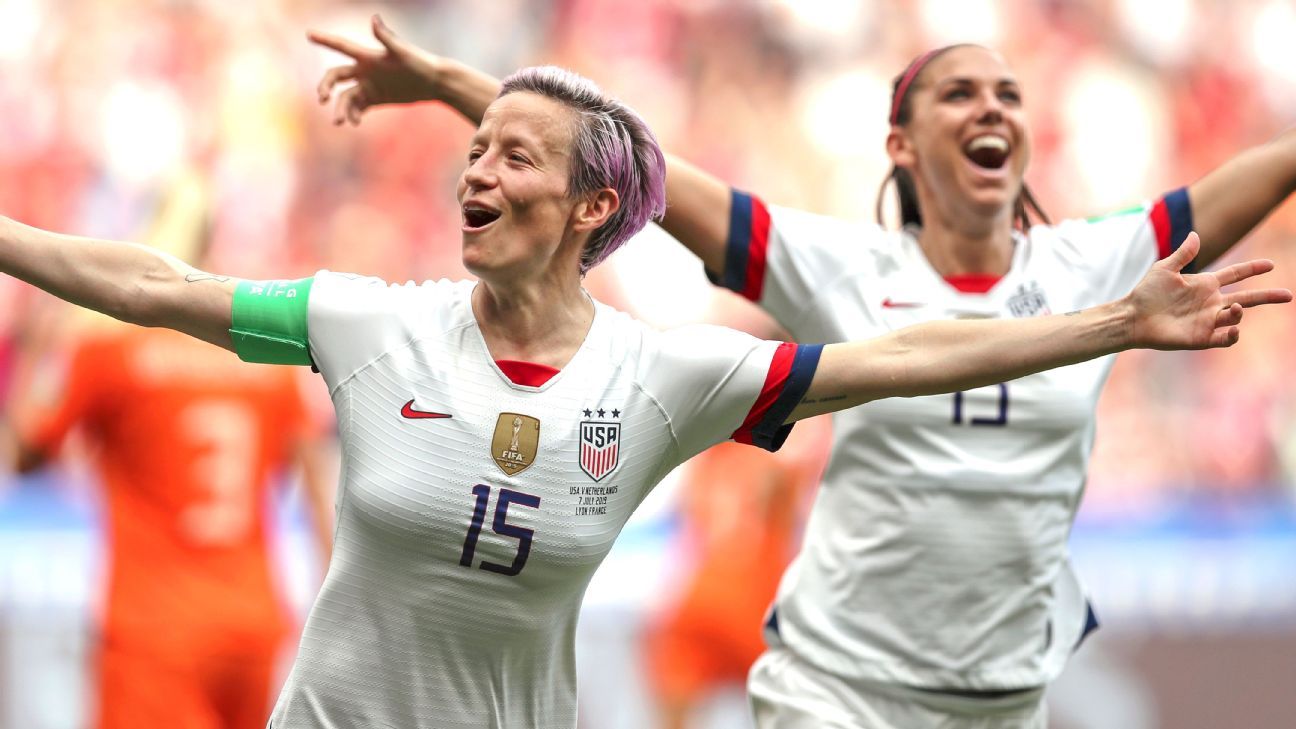
LYON, France -- It was less than a decade ago that some members of the French women's national team posed nude for a German publication, in what was essentially a protest on the eve of a Women's World Cup. What would it take, the captions asked, to get fans back home to watch them play a sport that is otherwise a national obsession?
When France and the United States played an epic World Cup quarterfinal in front of more than 45,000 in Paris, 51 percent of the televisions in use in the host country were tuned to the game.
In England, where the sport's domestic governing body outlawed the women's game until 1971, that team's semifinal against the U.S. was the country's most-watched sporting event since the men played in a World Cup semifinal a year ago.
After the Netherlands beat Sweden in the other semifinal, De Telegraaf, the nation's largest newspaper, turned its entire front page over to the team reaching its first World Cup final -- just as the paper did two years ago when the Dutch women won their first European championship.
Welcome to the new normal.
The United States is again on top of the world. The team everyone wanted to beat -- and the team many invented reasons to hate -- extended its own record with a fourth World Cup title and won back-to-back World Cups for the first time. On European soil, five of the best European teams the continent had to offer couldn't stop it. Sunday made clear that the U.S. owned 2019.
Yet the reality for 2023 and beyond was already clear: Europe no longer follows our lead. And even as the U.S. won this title Sunday with a 2-0 victory against the Netherlands, it watched a monthlong preview of a more complicated future.
Or as U.S. coach Jill Ellis said before a game against Spain in the round of 16, it was only "a matter of time" until this sleeping giant of a continent awoke to the women's game.
With that in mind, picture where we are after Sunday's win as a location on Google Maps. Zoom in and zoom out to study it from three different perspectives.
The street view is 90 minutes of soccer. From that vantage point, the U.S. beat the Netherlands because they were too deep and relentless as the game wore on in the second half.
Pull back the focus slightly more to a neighborhood view and Sunday is the final part of a World Cup cycle that encompasses at least the three years since the last Olympics and arguably all four years since winning the World Cup in 2015. Ellis will always have her detractors, but they will have to work to turn this into something other than vindication. She won with a team she didn't have much say in shaping in 2015. She won with a team of her own making in 2019.
But zooming out to the final and widest perspective, the global view, reveals what ought to keep Ellis and everyone else associated with American soccer awake at night.
The U.S. has the deepest and most talented roster in the world. Its confidence and belief, collectively and individually, is unmatched. Its fitness is unmatched. It is the best in the world at the moment. But only at the moment because so many European teams -- France, England and the Netherlands, certainly, but also Italy and Spain -- have come such a long way in such a short time.
"You now have, let's say the right of women to play -- you know, it wasn't there 20 years ago," Ellis said of the evolving European dynamic before the U.S. played its first knockout game. "Now you have that. To me, it's a natural progression in terms of the development in these countries. Because they eat, sleep and breathe soccer."
Imagine what will happen if Europe maintains its rate of progression. The risk for the 2023 World Cup, or even next year's Olympics, is that staying on top is partially out of American hands.
"It's no secret we have to get better on the ball," Rapinoe said of the coming European wave after a win against France in which the U.S. had barely 40 percent of possession. "Playing better with it, better offensively, better in our possession and our passing. They were clearly much better than us in that tonight. So the level is just growing, it seems like every game.
"We have, absolutely, our work cut out for us."
This wasn't a monthlong phenomenon. The U.S. finished on the podium in just one of four Under-20 World Cups so far this decade. It didn't finish among the top three in any of four Under-17 World Cups. Along with Japan, European teams from France, Germany and Spain dominated those events, with England and Italy in the top three as often as the Americans.
For U.S. defender Ali Krieger, the lightbulb moment came while playing professionally in Germany more than a decade ago. Not far removed from playing college soccer at Penn State, she looked up during a Champions League knockout-round game and saw a 16-year-old teammate enter as a substitute. That's a far cry from a high school game.
"That's the different mentality," Krieger said recently. "They're thrown into their professional system so early, and that's why they develop these really good players at a young age. It's just a different model. Obviously, I encourage everyone to go to [college] and have that experience. But if you want to be a top player in our country, you have to understand the basic principles of the game. And you have to understand them at a young age and really grow with the game because the game constantly changes."
At the time she was in Europe, it was more difficult to find that kind of professional setting outside of Germany and Sweden. That's no longer the case. Winner of the Champions League in each of the past four seasons, Lyon leads the way. But viable leagues exist in England, France and Spain, countries not so long ago resistant to the women's game. Manchester United added a women's team last season. Real Madrid will field one beginning in 2020.
Even FIFA refereeing czar Pierluigi Collina noted recently that after so many years of cultural neglect, his native Italy set television records as its national team advanced to the quarterfinals. The same Italy where Juventus just won its second domestic title in its second year as a team.
France had been the flag-bearer for this new wave of European success, which only added to the pain of its quarterfinal loss. After reaching a World Cup semifinal for a second consecutive time, England is in the midst of turning domestic investment into international glory. The Dutch never made a World Cup before 2015. They came within a game of a world title.
But almost as telling of the U.S. predicament was the first knockout game, when a Spanish team that qualified for its first World Cup in 2015 went toe to toe with the Americans.
Now a member of Reign FC in the NWSL who played collegiately at the University of Alabama for two seasons, Celia Jimenez Delgado was part of that Spanish team and grew up in the same world Krieger described. She wasn't a paid professional, but she played for Sevilla in Spain's top division at 16. She lived hours from her family, her roommate a goalkeeper in her 30s, all while coming through a youth national system for which those youth titles are a byproduct of preparing players for the senior level, rather than a goal unto themselves.
"Spain has a really specific soccer philosophy, or style of play, and I think that game has been developing for the past 10 years," Jimenez Delgado said. "The investment from the federation and the institutions that support the sport, they're providing more money and more resources.
"At the end of the day, if you as an athlete take care of every variable you can control, but you're not provided with a platform or the materials or the coaching staff to keep growing as an athlete, it's harder to improve."
None of which is to say that the European game is without its own issues of sustainability and support, despite the influx of brand names behind teams. But no matter what happened Sunday in Lyon and no matter who coached the team or how that person constructed it over the past three years, that is the world the U.S. now inhabits. Social progress on this order rarely regresses. Girls who grow up in Madrid, Manchester and Milan will continue to play the game.
That happened in the blink of an eye.
Netherlands defender Merel van Dongen, 26, was the only player on the field Sunday who went to an SEC school. She was 19 years old when she left home to play on scholarship for the University of Alabama. As a teenage player at home, she recalled working multiple shifts at a restaurant during the day, then training for two hours after work.
"Then I went to Alabama, where they had a budget for women's football that was insane," van Dongen said before the final. "The only thing I had to do was train and play, and they did everything for me. OK, I had to make good grades in school. But that was the difference, it was so professional. They [taught] me how to take care of my body. I thought I knew what training hard was until I went to the University of Alabama.
"One of the reasons I'm here is what I learned in the United States."
Empires rarely vanish overnight. Rome produced emperors and influenced the world long after it was sacked by the Goths. And the U.S. still has massive advantages in women's soccer.
Even amid decreasing youth participation in the U.S., no European rival will ever be able to match the overall talent pool in a nation of more than 300 million people. And as Jimenez Delgado was quick to point out from her time at Alabama, Title IX creates a legally mandated equality of opportunity that isn't the case in much of Europe. She came to the U.S. precisely because it is possible to mix playing soccer and studying aerospace engineering in college.
But there are options now. The year after van Dongen left Alabama, the Netherlands qualified for its first World Cup. Two years after that it won the Euros at home. Everything changed.
"If you're 18, 19, you don't have to work seven hours a day to make your money," van Dongen said. "Absolutely not. You get a contract and you work and you train and you become a professional. It even starts from younger ages -- Ajax, for example, they have a youth academy. A lot of the teams have youth academies now, something that I always wanted but couldn't do.
"That's also something I take from the United States, is that they have such a history and they have been building young players. And we're doing that now as the Netherlands."
So, yes, the demise of U.S. women's soccer would be greatly exaggerated. Like Brazil in men's soccer, the U.S. will continue to produce so much talent that choosing a national team roster remains a riveting storyline second in popularity only to second-guessing coaches. The U.S. will remain among the favorites in every tournament. Also like Brazil, it won't win most of them -- which the U.S. did in winning eight of the 14 major titles available to it between 1991 and 2019.
But when it comes to identifying, developing and training the very best players among us, it also wouldn't hurt to follow someone else's lead for a change. Despite a four-month college season and a pay-to-play/win-at-all costs youth culture, the U.S. has succeeded in spite of these things in the past.
It succeeded in spite of those things in 2019. It won't forever. It won't, at least to the extent it has, for much longer.
"It was a matter of time," Jimenez Delgado said in regard to Spanish success at the youth level translating to senior success. "For the results to start showing."
This U.S. team is the best in the world. The past month showed that time was up on the American game leading the way.
Tagged under
Social media celebrates United States' fourth Women's World Cup title
Published in
Breaking News
Sunday, 07 July 2019 11:07
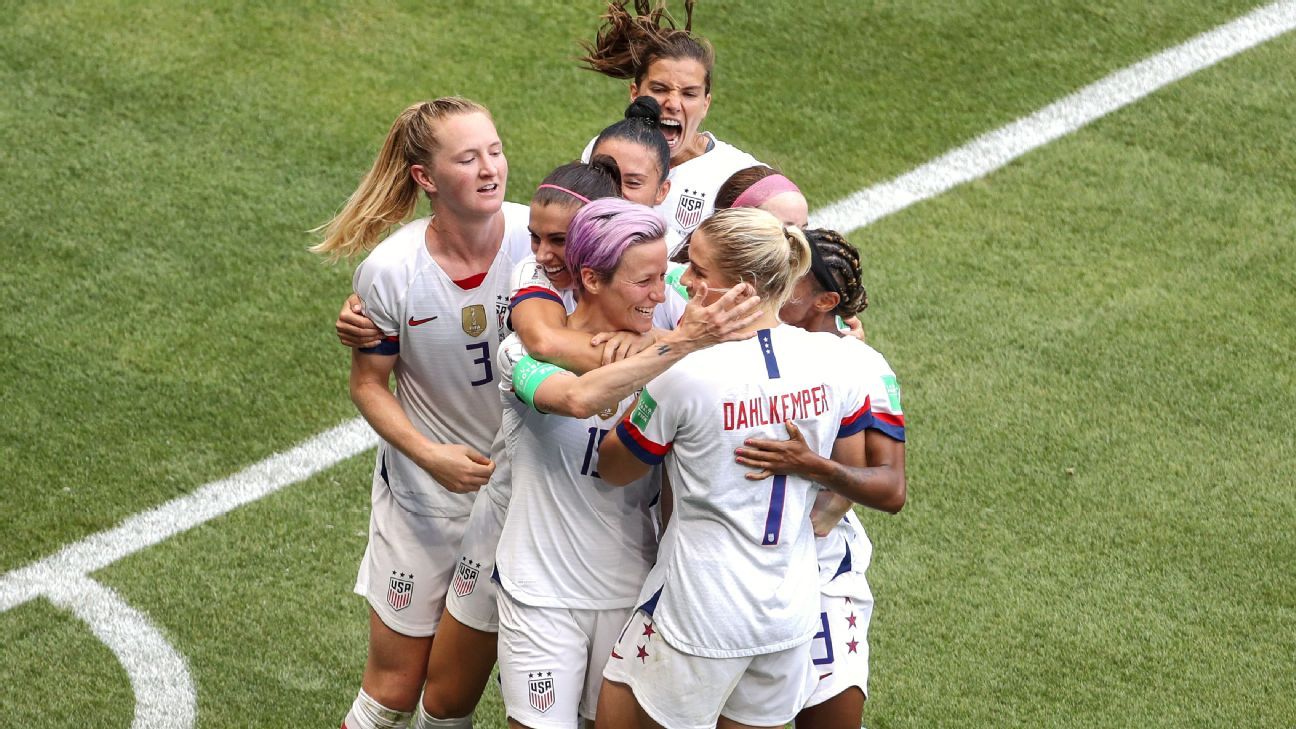
The United States remains on top of the world.
Thanks to Megan Rapinoe and Rose Lavelle, the U.S. women's national team beat the Netherlands 2-0 on Sunday to repeat as Women's World Cup champions.
It's the fourth championship for the U.S., which also won in 1991, 1999 and 2015. Only in this one, the Americans broke the record for most goals in a single Women's World Cup with 26.
Rapinoe scored on a penalty kick in the 61st minute, thanks in part to video assistant referee technology, while Lavelle's blast past Netherlands goalkeeper Sari van Veenendaal, who stood on her head with four first-half saves, doubled the U.S. lead.
People around the world gave the U.S. team the props it deserved:
Let's Go! ???
— Tom Brady (@TomBrady) July 7, 2019
Woo-hoo! Congratulations to the @USWNT on their World Cup win. Your persistence on and off the field inspires girls and women everywhere to dream big, fight hard, and win. #FIFAWWC #OneNationOneTeam
— Elizabeth Warren (@ewarren) July 7, 2019
YES YES YES YES!
To our 2019 World Cup Champion @USWNT: you have inspired the entire country - and New York City knows how to celebrate champions. We'll see you Wednesday at 9:30 AM for the Ticker Tape Parade down the Canyon of Heroes. #OneNationOneTeam pic.twitter.com/bwCEoJYg3r
— Mayor Bill de Blasio (@NYCMayor) July 7, 2019
Yes! Fourth star. Back to back. Congrats to the record breakers on the @USWNT, an incredible team that's always pushing themselves-and the rest of us-to be even better. Love this team. #OneNationOneTeam
— Barack Obama (@BarackObama) July 7, 2019
The US women's soccer team are the world champions! I'm so happy. These women are the best of what our country represents. You're welcome on my show any time. My World Cup runneth over. @USWNT #USA #FIFAWWC
— Ellen DeGeneres (@TheEllenShow) July 7, 2019
Congrats team USA! Billie says it best here! So happy for each one of you and so proud. ❤️ @USWNT https://t.co/WK2Yi2z8F4
— Serena Williams (@serenawilliams) July 7, 2019
Congratulations to the @USWNT
— Lucy Bronze (@LucyBronze) July 7, 2019
Worthy winners in the end #FIFAWWC
Can't wait for the next encounter already ??
Rose LaVelle is my favorite soccer player in the world ??⚽️??⚽️??⚽️??⚽️??⚽️??⚽️??⚽️??⚽️??⚽️??⚽️??
— Landon Donovan (@landondonovan) July 7, 2019
Incredibly inspiring World Cup by our @USWNT ?????????? so fun to watch ????????!!!! #FIFAWomensWorldCup #legacy #leadersonandoffthepitch #EqualPay
— Aaron Rodgers (@AaronRodgers12) July 7, 2019
Congratulations to 2019 Women's World Cup Champions @TeamUSA! ⚽️??
— Melania Trump (@FLOTUS) July 7, 2019
USA! ?? USA! ??
Congratulations and thank you @USWNT for your excellence, tenacity, and champion's spirit.
You did it. And we are ALL so proud! ✨ https://t.co/GG3Xq1tXf3
— Alexandria Ocasio-Cortez (@AOC) July 7, 2019
World champs-again!! To the amazing women of the #USWNT: Thank you for playing like girls. ?? pic.twitter.com/GWlLR0nwcX
— Hillary Clinton (@HillaryClinton) July 7, 2019
US Women's soccer soooooo bad ass!!! Congrats ??????????????
— Kevin Love (@kevinlove) July 7, 2019
USA!!! World Champions!! @USWNT are so amazing!!
— Mia Hamm (@MiaHamm) July 7, 2019
WE STAN MEGAN RAPINOE ??
— Major League Soccer (@MLS) July 7, 2019
RAN. IT. BACK. ? pic.twitter.com/0UkVfZuxcw
— ESPN (@espn) July 7, 2019
It's 2-0! @roselavelle ?#USAvNED | #FIFAWWC pic.twitter.com/c5teQDCmKT
— NWSL (@NWSL) July 7, 2019
Tagged under
Megan Rapinoe, USWNT repeat as World Cup champs
Published in
Breaking News
Sunday, 07 July 2019 08:10
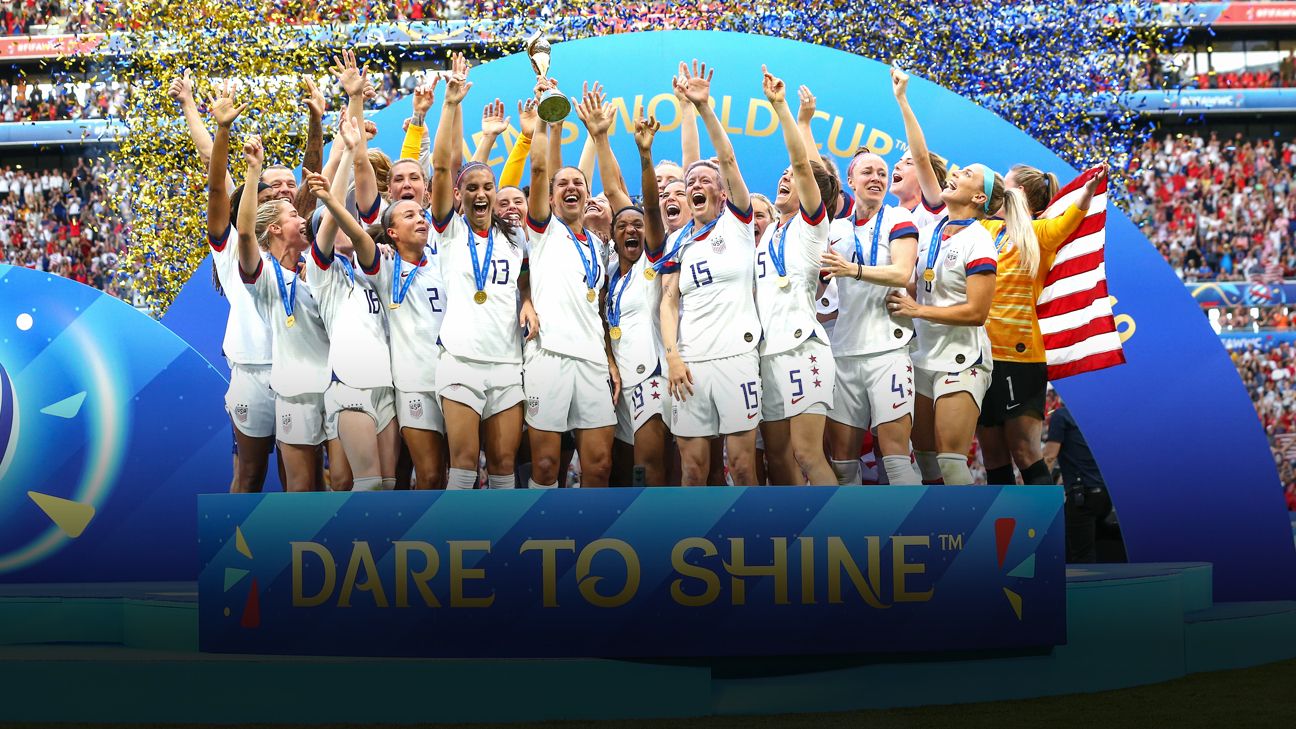
LYON, France -- The rest of the world will have its turn. But not here. Not yet.
In a Women's World Cup marked by European success, the United States is the last team standing. Slow at the start for the first time, the U.S. women came to life in the second half to beat the Netherlands 2-0 on Sunday on second-half goals from Megan Rapinoe and Rose Lavelle.
The fourth title overall for the United States also marks the first time it won back-to-back trophies.
Rapinoe won the Golden Boot as the tournament's top scorer and the Golden Ball as its top player. Alex Morgan won the Silver Boot.
Megan Rapinoe makes her mark where Lieke Martens can't
1:19
Is Megan Rapinoe in the top 5 USWNT of all-time?
Kate Markgraf says Megan Rapinoe handled the pressure of the 2019 World Cup beautifully, but does the Golden Boot winner crack her top five all-time?
The biggest question going into the final was the health of two stars, after Rapinoe missed the semifinal with a hamstring injury and Martens left at halftime of Netherlands' semifinal with a foot injury.
The USWNT is on top of the world again, but the gap is closing
Social media celebrates United States' fourth Women's World Cup title
Both started the final. Neither finished the final. That was where the similarities ended.
Rapinoe didn't play the game of her life. She looked at times like someone whose touch was half a beat off after missing training. But she put the ball in dangerous spots multiple times in the first half, denied only by Sari van Veenendaal's goalkeeping. And with the ball on the penalty spot in the 61st minute, Rapinoe calmly finished her third penalty in as many tries this World Cup.
The goal tied her with Morgan and England's Ellen White for the tournament lead.
The first woman to start three consecutive World Cup finals, Rapinoe will go down as the face of this tournament -- and the voice of this tournament. Sunday wasn't quite the capstone that Carli Lloyd enjoyed four years ago with a hat trick in the 2015 final in Canada, but it was more than enough.
Rose Lavelle is bound for bigger things
What we'll remember is the goal, but there was much more than that.
Perhaps the most impressive moment for Lavelle in this World Cup came when she talked about her performance in the quarterfinal with France. Granted, the U.S. women survived that game, so there wasn't guilt involved in the days after, but it's not often you hear a player pull out the word "atrocious" when talking about her own play. All the more for someone playing in her first World Cup in her early 20s. The point being, Lavelle kept a pretty even keel for such a big stage.
And after a strong semifinal performance against England, she was good from the start in the final. Whether it was dropping back into a left back position to cover for Kelley O'Hara at times or chasing 50 yards back to blow up counters (albeit sometimes off her own turnovers), Lavelle, who won the Bronze Ball as one of the tournament's top players after scoring three goals in six games, was always easy to spot because she was right in the middle of the action.
Then came the 30-yard run with the ball. The Dutch defenders retreated and retreated, she made one quick touch to her left to get past Stefanie van der Gragt, then shot back in the direction she came from. The United States waited a long time for Lavelle to shake up its midfield, showing patience as she battled injuries after a sensational debut in 2017. It was well worth the wait for a rising star.
VAR makes its mark in World Cup final
Sunday was the first World Cup final for the Netherlands and the first for about half of the U.S. starting lineup. Almost an hour into the game, VAR made its debut, too.
After having more of the ball in the opening half without getting anything past van Veenendaal, the U.S. women were struggling to come up with a cohesive attack in the second half when Tobin Heath sent in a cross from the right side. The ball deflected off a Dutch player and floated toward Morgan. That was when van der Gragt, perhaps trying to get her bearings on the redirected ball, lifted a boot high toward the ball but made contact only with Morgan's arm. The referee initially signaled for a corner kick, but as fans chanted "V-A-R" she signaled that the VAR officials had advised her to review the play.
Considering van der Gragt missed the ball and her cleats made contact with Morgan's arm, replays left Stephanie Frappart little choice but to point to the spot for a penalty.
No quick start for the United States
The streak of early goals was going to end at some point, no matter how well the U.S. women played. The Americans scored inside of 15 minutes in each of their first six games, and the sport just doesn't work that way for even the greatest teams. But it wasn't bad luck or bad bounces that stopped the United States early in this game. The Americans just didn't play very well.
Julie Ertz got caught up field, leaving too much space for the Dutch to counter. O'Hara was called for a foul throw. Rapinoe couldn't skip past a defender on the left side and jogged after the play. Abby Dahlkemper launched one of her normally pinpoint cross-field long balls ... right into the arms of van Veenendaal, who won the Golden Glove as the tournament's top goaltender. There was not only a lack of precision, but even the energy seemed off in those opening minutes.
The upside for the United States was that the Dutch seemed willing to absorb and take their chances later, launching only a couple of dangerous counters in that time. They came to regret that.
Ali Krieger gets her moment when the United States needs it
Ali Krieger is one of the most positive people you're likely to encounter in any walk of life, someone who forged her own path playing professionally in Germany after dealing with a serious medical issue during her time at Penn State. But she admitted before this World Cup that being dropped from the U.S. team after the 2016 Olympics took her to a dark place.
She didn't know why she was out of the mix. She didn't know what it would take to get back in, as the United States auditioned young outside back after young outside back for the role she filled in both the 2011 and 2015 World Cup finals. Finally, with only weeks to go until this World Cup, she got the call from Jill Ellis. With no obvious replacements seizing their chance, Ellis settled for the veteran presence. It paid off Sunday afternoon. So did Krieger's perseverance.
With O'Hara out of the game at halftime, presumably related to a head-to-head collision with Martens near the end of the half, Krieger warmed up while the rest of the team was in the locker room, then came on and did her job for 45 minutes.
Was it a star turn? No. But it was what the U.S. women needed.
Tagged under
Spurs acquire Carroll, Wiz land Bertans in trade
Published in
Basketball
Saturday, 06 July 2019 15:45
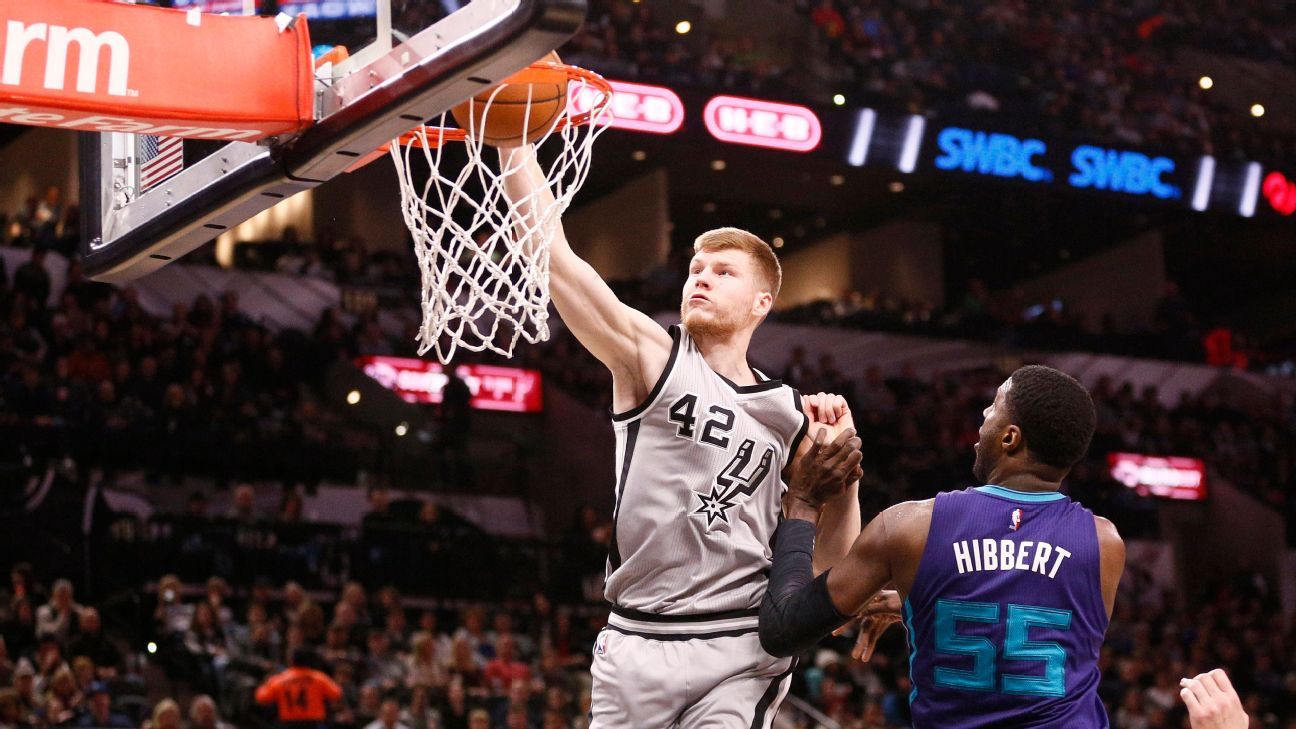
The San Antonio Spurs have acquired forward DeMarre Carroll from the Brooklyn Nets in a three-team deal that sends Spurs stretch-4 Davis Bertans to the Washington Wizards, the Spurs announced Saturday.
As part of the deal, Brooklyn receives the draft rights to Nemanja Dangubic from the Spurs and Aaron White from the Wizards.
Bertans will be absorbed into an exception, allowing the Spurs to take back Carroll in a sign-and-trade.
The Spurs also reworked Carroll's deal to make it a three-year, $21 million contract, the former Nets player's agent, Mark Bartelstein, told ESPN. The original agreement was for two years and $13 million.
The 6-foot-10 Bertans is entering his fourth season in the league. The 26-year-old has shot 40% from 3-point range in his career, including 42.9% last season, when he averaged 8 points a game for the Spurs.
Carroll, who will turn 33 on July 27, spent the past two seasons with the Nets, largely coming off the bench last season after starting in 2017-18. He averaged 11.1 points with 5.2 rebounds per game last season.
The Missouri product has played for the Grizzlies, Rockets, Nuggets, Jazz, Hawks and Raptors in his 10-year career, never spending more than two seasons with any one team.
Tagged under

LAS VEGAS -- Raptors head coach Nick Nurse said he understood why Kawhi Leonard decided to leave the team after winning an NBA championship, but admitted being disappointed that Leonard and the rest of Toronto's 2018-19 roster won't be able to try to defend their crown together next season.
Leonard will join the LA Clippers on a four-year, $141 million contract, league sources told ESPN's Adrian Wojnarowski.
"I think you can't blame a guy for wanting to go home," Nurse said Saturday night at the Las Vegas Summer League. "That's what he texted me today. 'I'm going home.' And I just said, 'You've changed a lot of lives, man, by what you've accomplished in Toronto. Mine especially.' And thanked him for what he did, and we'll look to the future, and we'll look to [win a title] again."
Nurse said the possibility of Leonard leaving was always something the organization was aware of from the moment it acquired him from the San Antonio Spurs last summer. Nurse said he was hanging out with a couple of members of his staff when he got the news that Leonard, who grew up in Southern California, was leaving Toronto to play for the Clippers.
"I was just hanging out with a couple of the assistants," Nurse said. "Got the text message and then got the news report quickly afterward. I'm not totally surprised. I think we all knew that [Leonard leaving] was a situation that could happen. He delivered big-time, played his heart out for us. We certainly are going to relish this championship for a long time. And we're going to stop celebrating it pretty soon. Not quite yet, but then we'll get back to work. I mean we got a tremendous challenge ahead of us, but I always say that the challenge is our fuel and the tank is certainly full. So we got a change for some guys to expand their roles maybe that wouldn't have had expanded roles in the situation, and I think we got some guys capable of doing that. So I look forward to the challenge as I said, and let's go get after it."
Nurse acknowledged that Leonard's departure left some understandable sadness within the organization.
"It's certainly disappointing," Nurse said. "I think, first of all, he's a great person. He was unbelievably fun to coach, just locked in and loaded and ready to go. People would ask me, 'What was it like coaching him?' And I always said the best thing was I got to stand there on the courtside and watch this guy go to work. That was something that I'll never forget. Now we got to go kick his ass."
In the end, Nurse said that he didn't think there was anything the Raptors could have done differently to get Leonard to stay. Ultimately, the desire to play in Los Angeles alongside Paul George was too strong to pass up.
"I think when we first got him there were a lot of questions thrown at me like, 'What are you going to do to keep him?' And we said, 'We're going to take great care of him health-wise.' We did an unbelievable job, Alex McKechnie and his staff. I thought we managed that to a T. We said we were going to have a good team ... and we did that as well. We knew we'd give him tremendous support from our fan base, and we certainly did that. That was amazing, the reaction and support that the whole country gave our team and him."
Nurse said he had been in touch with Raptors team president Masai Ujiri since Leonard made his decision and was confident the Raptors would be able to get back on track.
"Look to the future and try to do it again next year," Nurse said. "I don't know at this particular time how we do it, but it's not unlike going into a playoff series. I'd look at these teams and I'd say, 'I don't know how in the hell we're going to beat them,' and then you go to work and put a plan together. So right now I'm not sure how we're going to be able to do it, other than we're going to come out and guard you, and we're going to move the ball, and we're going to play with energy, and we're going to try and play a lot of people, and we're going to keep developing our guys. And Masai and [general manager] Bobby [Webster] will keep acquiring talent. And I'll coach the team that they give me, and I'll do that to the best of my ability."
Nurse also brushed off the suggestion that tampering by the Clippers might have played a part in Leonard's decision. He said the Raptors are not pursuing a tampering claim with the league office.
"From my standpoint, I didn't sense it or don't have any of those feelings at all," Nurse said. "I again state that he's going home, and that's a heart draw for any of us. If you guys were all playing somewhere else and got a chance to go back and make the most money you make in your hometown ... are you going to go home and do it? Again, we'll wish him well and the best of luck until we have to go against him."
Tagged under
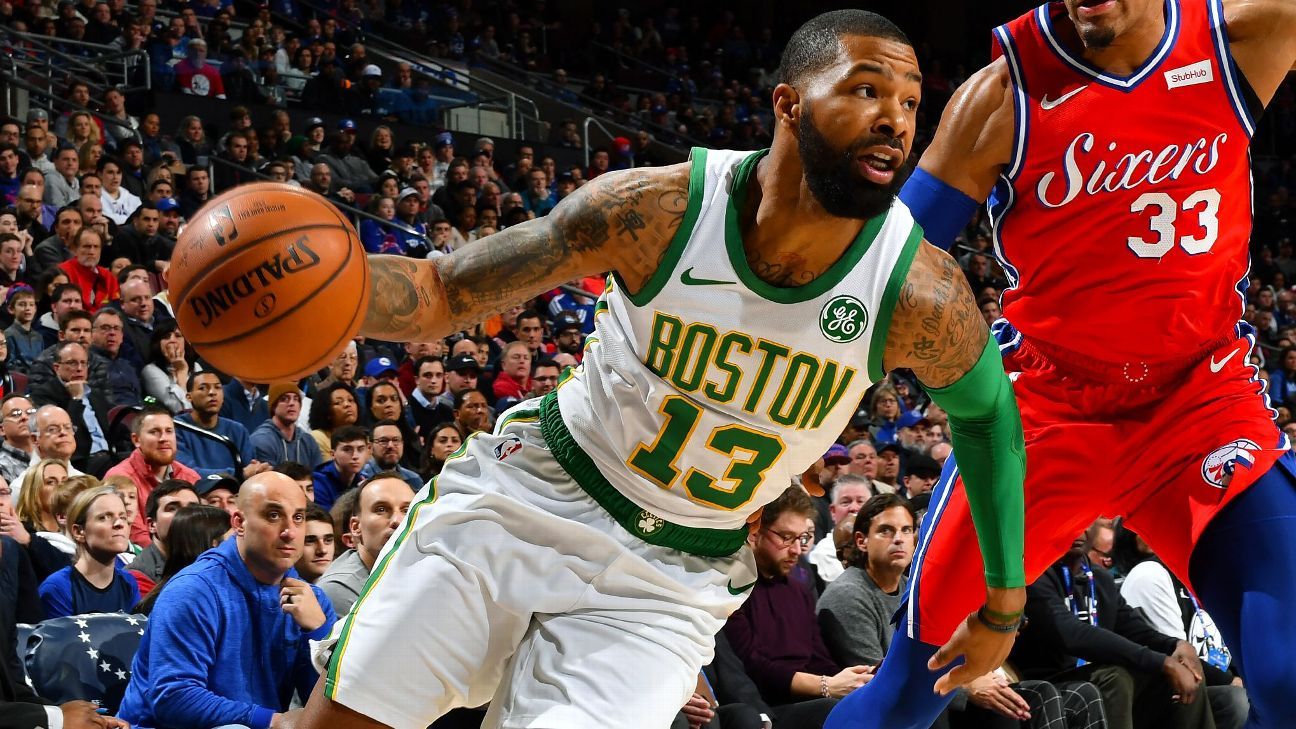
The San Antonio Spurs are signing free-agent forward Marcus Morris, his agency, Klutch Sports, announced via Instagram.
According to The Athletic, Morris will receive a two-year, $20 million contract, with the second year being a player option.
Morris was an unrestricted free agent after coming off a four-year, $20 million contract that many in the NBA considered the best bargain in the league.
The 29-year-old forward had spent the past two seasons with the Boston Celtics, who acquired him in 2017 as part of the Avery Bradley trade with the Detroit Pistons.
In Boston, Morris excelled with his tough play and vocal leadership. He averaged 13.9 points and 6.1 rebounds in 75 games (53 starts) last season, shooting a career-best 44.7% from the field.
The eight-year veteran holds career averages of 11.5 points and 4.6 rebounds per game.
Tagged under
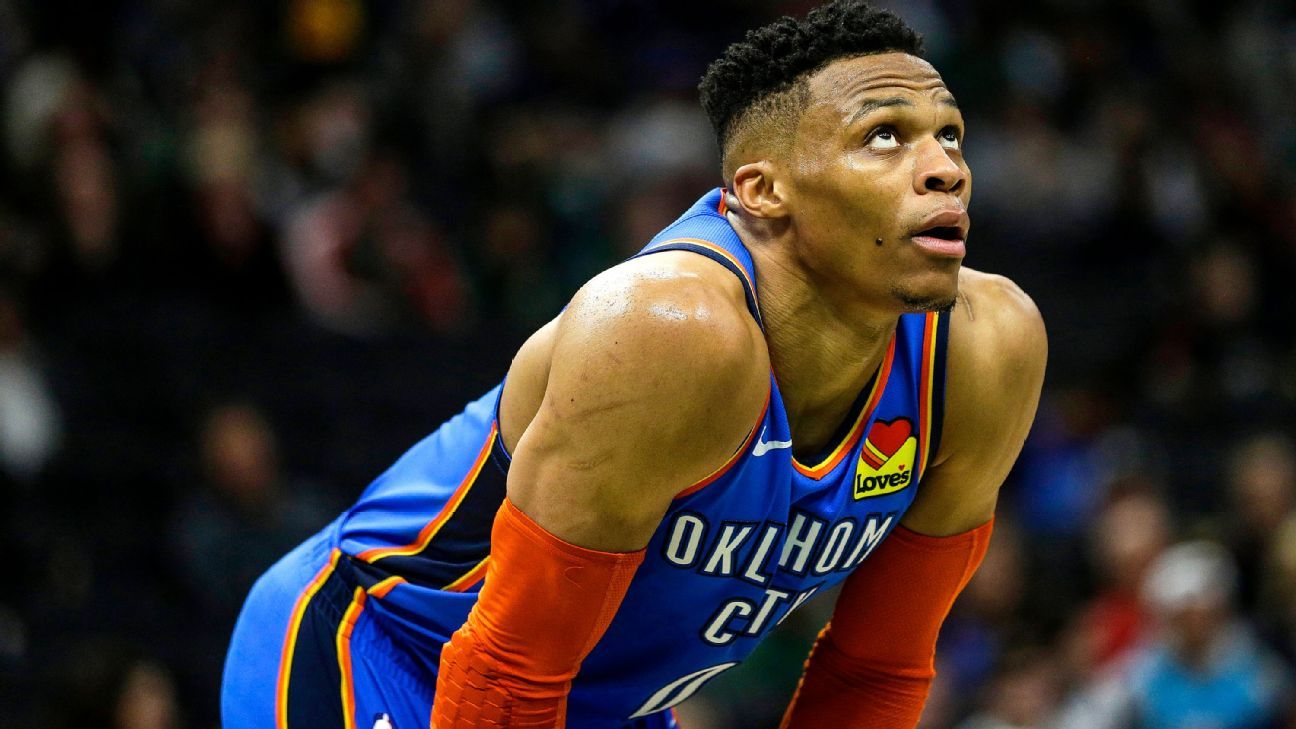
The Houston Rockets are among the teams interested in trading for Oklahoma City All-Star point guard Russell Westbrook, sources with knowledge of the team's thinking told ESPN.
One Rockets source, however, described trading for Westbrook as a "long shot" due to the challenge of finding pieces that fit with the Thunder or pulling off a complicated multiteam deal.
In the aftermath of the trade that sent Paul George to the LA Clippers, Westbrook and his agent, Thad Foucher, engaged with Thunder general manager Sam Presti about the next step of the point guard's career, including the possibility of a trade before next season, ESPN's Adrian Wojnarowski reported.
Westbrook, 30, has spent his entire 11-year career in Oklahoma City, but the franchise seems primed for a rebuilding period after receiving a record haul of five future first-round picks and All-Rookie point guard Shai Gilgeous-Alexander in the George deal. The Thunder also received forward Danilo Gallinari in the trade, but the veteran versatile scoring threat could be rerouted to another team.
The Athletic reported that the Miami Heat and Detroit Pistons also have interest in Westbrook, who averaged 22.9 points, 11.1 rebounds and 10.9 assists last season, marking the third consecutive campaign he averaged a triple-double.
The interest in Westbrook fits Rockets general manager Daryl Morey's pattern of aggressively pursuing superstars. Houston landed Chris Paul in a sign-and-trade deal with the Clippers two years ago and attempted to add Jimmy Butler under similar circumstances this summer. Butler, however, did not meet with the Rockets before agreeing to a deal with the Miami Heat. The Rockets also had interest in trading for Carmelo Anthony and George before the Thunder dealt for both during the 2017 offseason, and Houston signed Anthony for the veteran's minimum after he was traded to Atlanta and received a buyout last summer.
A source said that Paul would not necessarily need to be involved in a deal that delivers Westbrook to the Rockets, although his $38.5 million salary is a perfect match with Westbrook's. Paul has $125 million over three years remaining on his contract, while Westbrook has $171 remaining over four years, including a player option for $46.7 million in 2022-23.
Morey has acknowledged aggressively exploring the trade market this offseason but said recently that Paul and perennial All-NBA guard James Harden are the two players who will definitely return to the Rockets next season.
Center Clint Capela and shooting guard Eric Gordon in particular have been shopped and would have been traded to other teams to make room for Butler, according to sources. Capela, 25, is coming off a season in which he averaged career highs of 16.6 points and 12.7 rebounds and is entering the second year of what is considered a team-friendly five-year deal worth $80 million plus incentives. Gordon is a proven scorer (16.2 points per game last season) and underrated defender who is due $14.1 million next season in the final year of his contract.
As unlikely as it may be, a trade that sends Westbrook to Houston would reunite him with Harden, his former Thunder teammate and fellow recent MVP. The Rockets acquired Harden, a sixth man in Oklahoma City, in a trade just before the 2012-13 season after the Thunder decided they did not want to give him a maximum contract.
Westbrook won the MVP in a close vote over Harden in 2016-17, when the Thunder point guard averaged a league-leading 31.6 points, 10.7 rebounds and 10.4 assists, joining Oscar Robertson as the only players in NBA history to average a triple-double for a season. Harden has won the scoring title the past two seasons and the MVP in 2017-18.
Tyson Chandler is also a likely target for the Rockets in their search for backup big, a source told McMahon.
Chandler, who turns 37 in October, was an effective defender and rebounder as a reserve for the Los Angeles Lakers last season. He has a reputation as a great locker room guy and has a strong relationship with Paul from when they played together in New Orleans.
Tagged under















 Phone: (800) 737. 6040
Phone: (800) 737. 6040 Fax: (800) 825 5558
Fax: (800) 825 5558 Website:
Website:  Email:
Email: 






